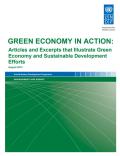This report by CARE highlights the need for Rio+20 to deliver on sustainable development solutions with equity and resilience as central pillars. It includes the following recommendations for the United Nations conference: ensure that discussions fully and explicitly recognise that urgent action on climate change must be part of a global action plan for sustainable development; prioritise adaptation and resilience to climate change in green economy as essential for the poorest and most vulnerable groups; pursue developed country mitigation strategies by shifting to low carbon development pathways globally; create a set of universal sustainable development goals (SDGs) that address all three (economic, environmental, social) dimensions of sustainable development alongside the drivers of poverty and inequality; recognise that solutions to these crises must be based on principles of good governance and equity.
This summary was prepared by Eldis.
This report attempts to shed light on whether nations can prosper without actually achieving sustainable growth. It also questions whether the benefits of continued economic growth still outweigh the costs, and scrutinises the assumption that growth is essential for prosperity. The paper argues that prosperity can only be conceived as a condition that includes obligations and responsibilities to others and that rising prosperity is not the same thing as economic growth. It further notes that the conventional response to the growth dilemma is to appeal to the concept of ‘decoupling’. This is where production processes are reconfigured, goods and services are redesigned, and economic outputs become progressively less dependent on materials. In this way, it is hoped that the economy can continue to grow without breaching ecological limits.
This report describes an evolving policy landscape in Asia and the Pacific characterised by a changing economic reality, rising demand for resources, increasingly apparent impacts of climate change and increased risk and uncertainty. It provides insights into Asian and Pacific resource use trends and outlines key actions that governments can pursue to help bring economic growth strategies in closer alignment with the objective of sustainable development. It also provides examples of strategies for improving resilience to help deal with the increasing levels of risk faced by societies and economies. The report is the product of a combined effort by three institutions: the Asian Development Bank (ADB), the United Nations Economic and Social Commission for Asia and the Pacific (ESCAP) and the United Nations Environment Programme (UNEP).
This summary was prepared by Eldis.
This paper argues that least developed countries (LDCs) are greatly threatened by human induced climate change, because their dependence on rain-fed agriculture and forestry as sources of employment and income make them vulnerable to climatic changes and variability. Many LDCs are already subject to climatic stress due to their location in the tropics and other areas subject to a high incidence of weather-related shocks. The paper notes that the most important source of greenhouse gas emissions in LDCs is land use change, in particular deforestation. Halting deforestation is, thus, a key priority for low carbon development.

The Green Economy is one in which the vital linkages among the economy, society, and environment are taken into account. This selection of articles and excerpts emerged in response to the need to fill the knowledge gap on practical, concrete, and on the ground green economy country experience. It is in this spirit that the articles and excerpts included in this publication have been selected: to provide information and knowledge for policy and decision makers and practitioners on the positive implications of greening some priority sectors, including job creation, resource efficiency, and generally contribution to sustainable development through an extensive review of scientific publications and magazines.
The sectors analysed are water, agriculture, energy, industry, business, ecosystems, technology, waste management. The report contains several case studies, including from China, Egypt, the United Arab Emirates, the United Kingdom and Europe.
